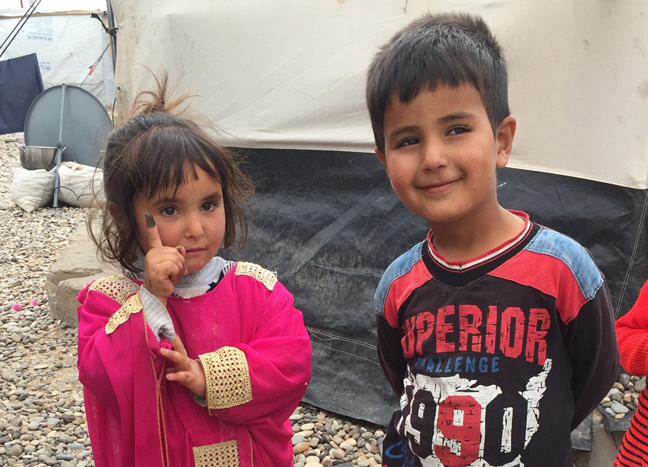You Made a People's Vote Possible
 Children took part of the festivities on election day.
Children took part of the festivities on election day.
As a displaced Iraqi, the ability to vote seemed unlikely. The parliamentary elections in May were already rescheduled once before. It seemed impossible to register in the displacement sites where 2.1 million Iraqis resided. Many had not returned to their area of origin where they were previously registered to vote. And many had not yet been able to replace the civil and legal documentation required to register to vote. These documents were lost or withheld when they fled from home.
Concerns abounded. Although the Iraqi government put special measures in place to enable displaced Iraqis to vote, safety was still an issue. Members of the Iraqi Security Forces guarded polling places. This made it impossible to maintain the civilian nature of camps. People worried about harassment from security stationed in and around the camps or harassment stemming from religious and ethnic tensions within the camps. Limited women’s access to polling stations was also a concern.
But with your support, Nonviolent Peaceforce kept civilians safe.
The pervasive feeling of celebration filled the air in all three camps on election day. These displaced Iraqis felt that the elections were a sign of the start of a return to normalcy and functioning democracy. People wore their best clothes, and children stood in the voting line with their parents to join in on the excitement. Supporters like you contributed to the day's anticipation.
Mid-morning, NP staff realized one of the women's voting lines was at a standstill. Only men were being called into the voting tent. Men began amassing around the women. As uncomfortable as the women seemed, they remained in line to cast their ballots. NP staff checked in with security to speed up the women's line. NP highlighted the need to have the women’s line move faster to reduce harassment by the surrounding men. It would also allow them to return to their unaccompanied children back in their tents. Soldiers were immediately instructed to call forward voters from the women’s line. For the rest of the day, there was no wait to vote for women at the polling station.
Before this election, Iraq began issuing special identification documents to expedite voter registration. Displaced Iraqis could use alternate documents if they could not get one of the special IDs in time. But on election day, those with the special IDs were not allowed to vote in the camp and had to walk several miles to a nearby town instead. NP staff spent the late afternoon following their ability to return to the camp after the long day. Displaced Iraqis walked past a former U.S. military installation that an air strike had hit, a destroyed elementary school, and the rubble remnants of a prestigious agricultural college. Despite the long, hot walk past clear evidence of violent conflict, both young and elderly voters showed up to cast their ballots. Your support helped make this happen.
